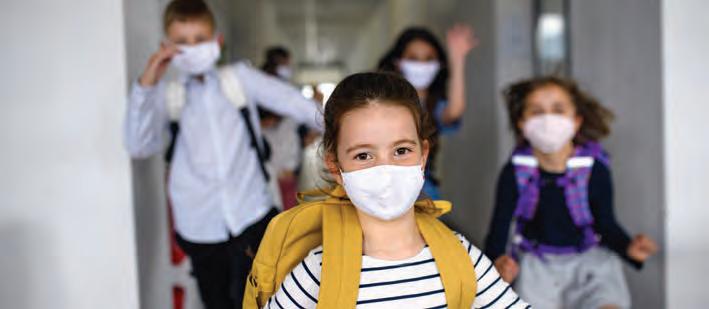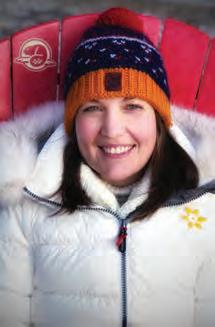
14 minute read
Nursing during the Pandemic
TRENT VOICES
preview
During the height of the provincial shutdown, earlier this spring, TRENT Magazine/The Trent Voices (TM) podcast sat down for a virtual interview with two Trent/ Fleming School of Nursing alumni to talk about what it was like to be on the COVID-19 front lines. Nurses Scott Wight ’11 (SW) and Natalie Beavis ’96 (NB) were joined by School of Nursing dean Dr. Kirsten Woodend (KW) for a unique glimpse into pandemic life in the healthcare sector.
TM: Health care workers everywhere are experiencing unique challenges. What does the COVID experience look like at your institution?
SW: I could probably echo a lot of sentiments with hospitals in Ontario, across Canada and around the world. It’s tense in the sense that we’re always in a preparatory and waiting stage for the next challenge we’re having to face. When COVID was first on its way, we were lucky that Canada hadn’t had too many cases. We were able to prepare and try to foresee what the challenges would be. I was fortunate to be involved with a lot of preparatory meetings, outlining what we’d need; what kind of assessment centres we would need; how we would respond to an influx of COVID patients, and so on. That preparation has led to a good foundation at our hospital.
Our staff are worried because the stocks of personal protective equipment (PPE) are low. They’re always waiting to see when the next dry spell of face masks and face shields or gowns will be. So that’s a worry. And we’re worried about how to support when long-term care facilities have 10 patients that need hospitalization—and what we’re going to have to do for them, and how we’ll have to support them. I think other hospitals have had it worse than us. I know that other communities have had it worse, so we’re very lucky. But we’re really trying to prepare for what the worst might be, and always in that state of readiness.
NB: I think that morale is strong. The one thing that really jumps out at me in terms of the themes is this whole notion of teamwork. I’ve seen individuals from all walks of the healthcare system work so well together with the common goal of keeping the community safe, patients safe, and caring for one another. I would say that, here, our PPE situation is quite good. We’ve had an immense outpouring from the community. The community has taken such great care of us and our healthcare workers

through large drives around everything from masks to caps to bands for securing surgical masks. The information I’m getting from our nursing staff is about feeling appreciated by the community.
I’m proud of the hospital because of what we’ve been able to exhibit: at the frontline, in the community (in our partnership with Public Health), and in our new partnership with long-term care. This notion of partnership has been strong and I couldn’t be prouder to be a nurse.
TM: Dr. Woodend, you’re not working in the hospital but you’re also not working at Trent right now. With the University shifting to remote operations, what are the working conditions like for you?
KW: It’s been odd. But I find it interesting that we talk about social isolation, because, in fact, we’re not very isolated. And thanks to venues like Zoom, I’m in meetings with colleagues and students five to seven times every day.
As you can imagine, in the winter semester our students’ placements (clinical education) had to be stopped because we couldn’t send them out into clinical after about mid-March. So we’ve had to struggle to find alternate ways to help them meet their learning outcomes, and to try to keep as many students on track as possible. I work with an amazing set of nurses at the School of Nursing, and there wasn’t one complaint as everybody reached out and worked extra hours to figure out how to meet our students’ learning needs so that we were continuing to graduate strong nurses who were well prepared to work in any environment. And the environment right now is very chaotic. TM: How are nurses (and doctors and hospital staff) feeling during this crisis? Is the tension felt throughout society prevalent?
NB: I think that, very often, we’re at our best when we’re most necessary; and so that preparation that Scott has talked about has provided us with a really good jumping-off point for absolutely anything that’s required. Just today, I had the wonderful opportunity of being able to go out and say thank you to our nurses in person, and what I saw were hardworking men and women devoted to patient care and really focused. That filled me with a lot of confidence. The morale, from my perspective, is really solid. I think that we’re all in the same place around patient care, and it’s a collective concept and idea that all nurses can really get behind. It’s something that we see from our Trent graduates. I had an opportunity to meet lots of new grads today because they’re out on our units working really, really hard. And we all have a sense of contributing to really good work together.
TM: How does it feel to be a frontline worker right now? Your chances of coming in contact with the virus is higher than with most people. How does it feel when you’re leaving work for the day and going home?
NB: We’ve been fortunate to have a lot of information about infection control. So, for myself, for my staff, and for all of the nurses here at the hospital, proper infection control practices are central. Our department has been responsible for providing PPE education, alongside Infection Prevention and Control (IPAC). Donning and doffing, for example, are very important when it comes to infection control. We’ve worked really hard to be able to share our lessons within the hospital, as well as with our partners in long-term care, for example. With that in mind, I do have a sense of confidence. But it’s evolved over time, because we started COVID in one place and we’re now in another. At this stage, when I go home, I feel safe and secure. I have a really supportive family. They’re proud of my work as a nurse. And I have a really supportive community that’s really proud of my role as a nurse. All of that feels great.
SW: I have my mother, who’s 70 and living at home with us, so there’s a bit of added responsibility. We’ve got two kids. I’m quite cognizant of what I’m touching at the hospital and who I am interacting with. Our hospital staff have been really great at supporting everyone, so I can work at home, which has been good. Unfortunately, I’ve also had to go in a lot, but there’s that understanding. As Natalie indicated, the education is really important. Understanding how we doff and don; enabling good practices. In the past, some people may have been complacent, but now, certainly, everybody everywhere can see the importance of these practices. And having specialized teaching towards COVID has been really, really important.
To be honest, it’s more of an underlying thought. I know that it’s always there. But my number one priority is supporting clinicians and nursing staff and ensuring safety and best practices.
TM: Dr. Woodend, how do you help prepare prospective nurses so that they’re emotionally ready for situations like this—not just at work, but with the work/home balance as well?
KW: We start in their first year by talking about the profession of nursing. There is actually a first-year, first-semester course where they are introduced to things like mindfulness, so that, right from the start, they have a more inner awareness of their responses to things. It’s quite interesting: we had conversations with the group from Peterborough Regional Health Centre last week in a focus group, and we’ve had meetings with other groups, and one of the things that we’re hearing is the importance of resilience. We do try to build resiliency into their experience: when they do practice on the units and they debrief with their teachers afterwards; or when they’re doing a simulated learning scenario and there’s a debriefing. The capacity to reflect on what you’ve done is important. And to think about alternative ways of doing things. And learning to share with your colleagues, because that’s part of resilience too. I must say, I’m thrilled to hear from Natalie that she’s been out there working with some of our new grads and that one of the things that she is observing is resilience.
I think, given that within the last approximately 20 years we’ve now had three outbreaks of a coronavirus, that this is our future. We are going to need to graduate nurses who are very resilient, so we’ll continue to look at how we do that. TM: What advice do you give to patients who are concerned about COVID-19 and trying to stay safe?
SW: Hospitals have procedures, and they have ways of doing things. Look at those standards. Wear a mask. Try to be proactive. I know, for myself, I try and be that person who hopefully people look to. And so I make sure that I go out with a mask and I actually take my little safety glasses too. And don’t touch your face. Try to stay away from people. As difficult as it is, socially isolate as best as you can without having to lose social interaction and care.
TM: Dr. Woodend, you do have a background in epidemiology. How concerned should people be about COVID-19? And what they can do to make themselves feel at least a little bit better in their day-to-day lives?
KW: We need to continue to adjust to this new normal without letting it dominate our thinking.
We’re very blessed in Canada, when you look around at, for instance, the disagreements in the UK or in the US, where multiple voices are influencing decisions that are made. We’ve been really lucky in Canada in terms of the consistency of information that’s coming out at the national level. And at the provincial level. And with our local public health units. Pay attention to the experts, and then use a lot of common sense.
I was reading an article just the other day that was suggesting that astronauts, when they get three quarters of the way through their trip, start to go through mood changes, and have struggles with mood. I think we’re in that stage now. We’re seeing the plateau and so we’re now thinking that a normal, or new normal, could be coming and we’re impatient for it. This may be a time, in fact, when we’re starting to have more struggles with mood. So, I think we need to make sure that we take better care of ourselves and reach out for support systems. Make contacts in all the ways that are now possible.
TM: How did your Trent experience help inform the work you do today?
NB: I think that the most unique aspect of my Trent experience was the ability to blend nursing science with the humanities. It allowed me to be someone who is a strong scientist and a strong caregiver at the same time. That has informed my entire nursing career. It’s given me an opportunity to be a well-rounded individual who’s also been able to engage in different components of nursing—which includes bedside work, academic work, decisionmaking work, leadership work. The experience at Trent taught me about being a holistic thinker, and that has also made me, from the nursing

perspective, an individual who’s been really interested in seeing my nursing self from various different vantage points. And it’s made for a wonderful career that I’m very proud of.
SW: I think one of the things that has really stuck with me, and certainly has been immersed into my practice, is the ability to be a role model and to be a collaborative resource—to be that person who can help, and work towards getting a problem solved or creating something amazing. I don’t think people realize the amount of background nurses need to have in terms of understanding: how you treat patients, how you treat your colleagues, and how you interact with people. There are a lot of social skills involved in being a nurse. You need to be able to communicate with people. And I really benefitted from an opportunity to work with leaders and professors at Trent who really embraced that. They took that holistic perspective to the next level. Trent University School of Nursing alumna Tsering Bharwani ’11—along with her husband, Saroop Bharwani—has started a program to help make life easier for frontline health workers and Liberty Village (Toronto) businesses. SensoGo has raised over $60,000 to supply locally sourced meals and gift packages for hospital staff, positively impacting the lives of over 1,500 workers. The money raised has been funnelled back into their community, with food and other products being purchased from local companies that have taken an economic hit from the pandemic.
Ms. Bharwani, who returned to her nursing position from maternity leave as the COVID crisis was first starting in Toronto, made the difficult decision to isolate herself from her family, spending months at home while her husband and daughter stayed with extended family. That experience was part of what influenced the couple to start SensoGo.
“I was one of thousands of healthcare workers who had made the sacrifice,” she explains. “I wanted to make sure they were all honoured and that the world knew about them.”
One SensoGo program, Front Line Moms, saw $25,000 worth of products delivered to 500 workers in carefully designed care packages. Ms. Bharwani was hands-on in choosing products and physically putting packages together.
“We went with things that were really useful,” she notes. “For example, there were many frontline workers who experienced skin problems from wearing masks for extended periods, so there were skin care products included that helped with that.”
SensoGo started small and grew organically. Inspired by a friend who had sent pizza to a floor of workers at a hospital, Mr. Bharwani did the same for Ms. Bharwani and her colleagues. Soon others were joining in. As CEO of Senso, a technology start-up, Mr. Bharwani reached out to partners in the tech sector. The couple soon had a website and started seeking sponsors in earnest.
They chose to work with business in their Liberty Village neighbourhood that were hit hard by the pandemic. Money raised was used to purchase either meals or contents of care packages for frontline workers.
Nursing Alumna Helps Launch Program to Support Frontline Staff, Local Businesses and the Black Lives Matter Movement

Front Line for Black Lives
When the Black Lives Matter protests began, the pair realized they could also use their platform to show their support. They enlisted Mr. Bharwani’s cousin, Sheena Melwani, to perform a song and then made a video with contributing frontline workers— including several Trent School of Nursing alumni.
“When I approached my frontline friends, they were excited and jumped on board,” Ms. Bharwani recalls.
“They are very passionate about this.” Healthcare and Black Lives Matter definitely intersect, she says. “Look at the stats. There are some alarming stats about Black maternal health, how Black mothers are three to four times more likely to die during pregnancy, or before or after delivery. Black people have higher risk of chronic diseases. Studying nursing, I learned about the social determinants of health, where you were born, where you live, the type of education you received, your employment opportunities, and how all of this impacts your health.”
She also recognizes clinician bias as an issue. “The bias that we healthcare workers carry—consciously or unconsciously—can impact your interaction with patients, your delivery of care, the amount of time you spend with someone, even being dismissive of symptoms. All these things contribute to the poor health outcomes that Black people are going through right now.”
Ms. Bharwani recognizes the change that can be made by her and her colleagues. “There are things you can do as a frontline worker, rather than passing it off as a systemic issue and leaving it at that. There are things that are in your control. You have the power to change that treatment, change the experience of a patient. As front liners in this video, we’re almost taking an oath to do that. We’re going to recognize this bias and dismantle it. When we see this kind of thing happening, we need to speak up. We have the power to change the narrative.”
Much of her passion for making positive change came from her time being part of a community at Trent. “I was pleasantly surprised by the diversity of Trent, how multicultural it was, and how that was celebrated. There was always a sense of belonging.”

Help shape the future of Trent as we update the Trent Lands & Nature Areas Plan
The Trent Lands and Nature Areas Plan will assist the University to achieve its vision of a ‘sustainable and inspiring campus community, thoughtfully integrating the natural and built environment with vibrant spaces to learn, innovate, be active and live.’
Visit trentlands.ca during the month of October to review the draft Nature Areas Stewardship Plan, the draft Framework Flan, and Guiding Principles. Share your comments and thoughts on the draft documents. Help us finalize the Trent Lands and Nature Areas Plan and shape the future of the Symons Campus.









